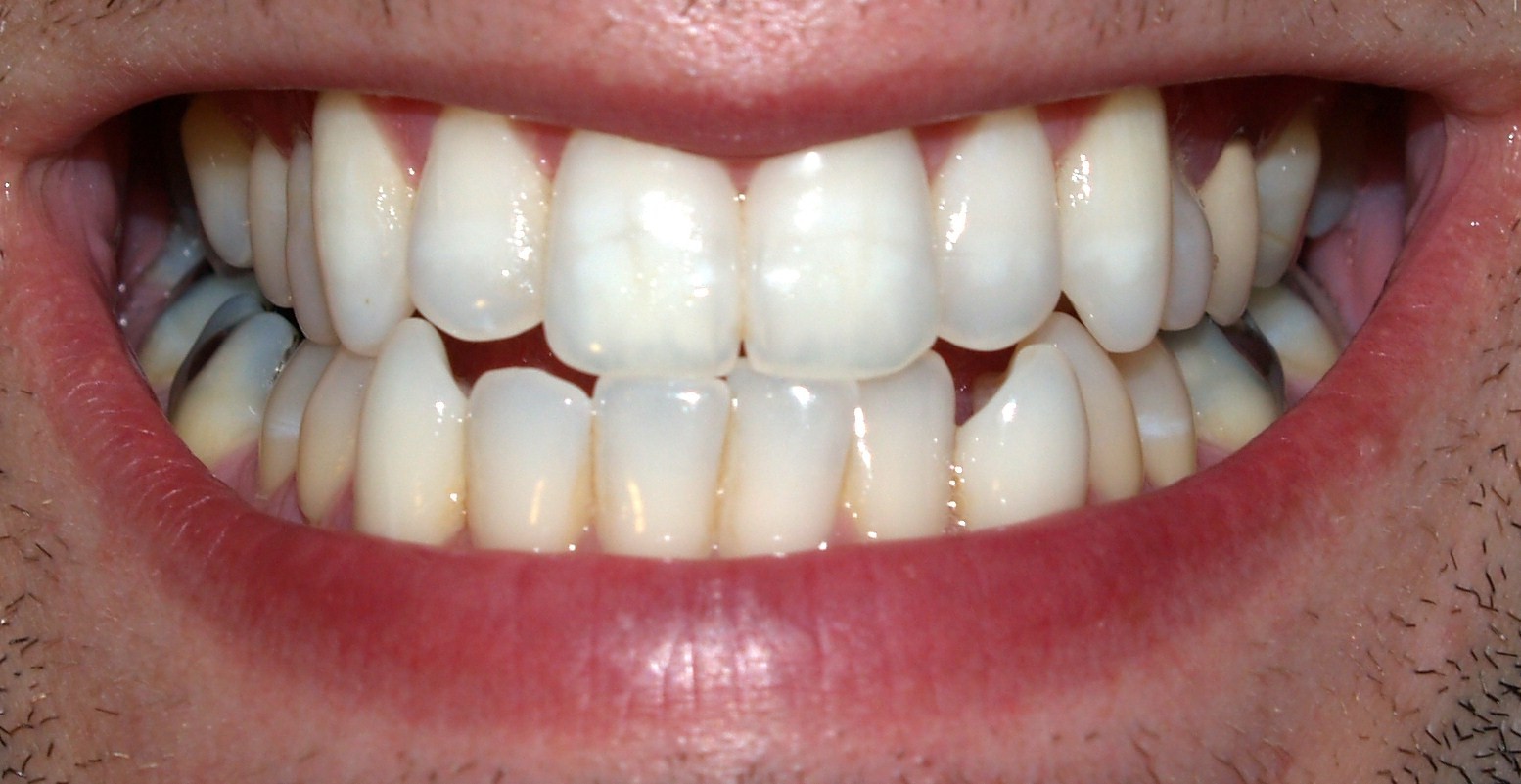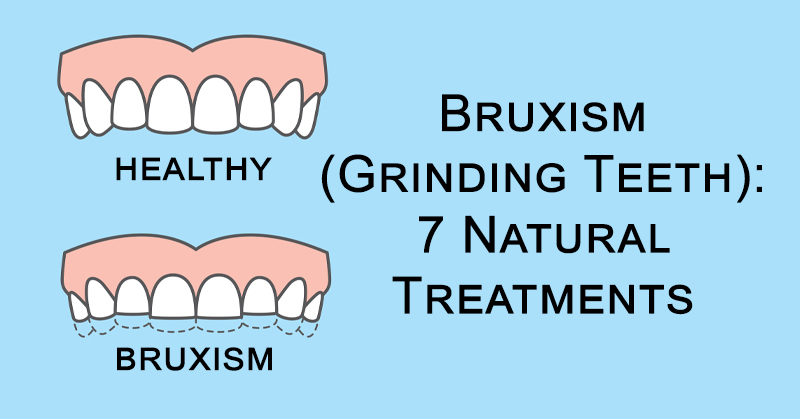Bruxism is a teeth grinding condition that affects people of all ages, but there are treatments available. This condition, however, can cause severe tooth damage, jaw disorders and headaches. And, contrary to popular belief, bruxism doesn’t just occur at night. Teeth grinding symptoms may occur while you are awake or asleep. However, more often than not, it occurs while you’re sleeping. And bruxism causes can vary. For example, asthma, upper airway infections, sleep apnea, depression and anxiety disorders can all cause bruxism. (1) Bruxism natural treatment methods can help provide relief from bruxism symptoms. If you suffer from bruxism, try some of the teeth grinding treatments outlined below.
Most experts agree that while there are several factors that can contribute to bruxism, one of the leading causes is increased psychological distress. And, as mentioned above, severe bruxism can lead to major dental complications, leading to expensive surgeries and necessitating the placement of crowns. Furthermore, bruxism can lead to the development of TMJ. This is a condition that can also occur due to clenching the jaw during stressful moments, such as a car accident or various types of assault. But TMJ can also come about as a result of bruxism. When you have TMJ, you’ll hear a clicking noise when you open or close your mouth.
If you have bruxism, some of these symptoms may sound familiar to you:
Bruxism Symptoms
- Awakening your sleep partner due to loud loud sounds of grinding and clenching
- Teeth are fractured, chipped, loose or flat
- Tooth enamel wears erratically
- Teeth become sensitive to hot, cold and sweets
- Pain or soreness in the face or jaw
- Tired or tight jaw muscles
- Pain in the ear
- A dull headache located in the temples
- Sore spots inside your mouth from chewing on your cheeks
- Indentations on your tongue

Bruxism Natural Treatments
1. Splint Plus Cognitive Behavioral Therapy
A study published in the journal General Dentistry found that an occlusal splint (a mouth guard) combined with cognitive behavioral therapy was significantly more effective than just an occlusal splint. Cognitive behavior therapy can help address underlying causes of bruxism, such as anxiety or depression. Addressing these issues can help diminish the physiological reaction to stress of grinding the teeth. When we’re tense or stressed, we tend to tighten up in such places as the shoulders, neck, and jaw. Bruxism is also a part of this reaction to stress. However, measures such as a mouth guard and CBT can help to retrain the brain to relax your muscles. And the combination of CBT and a mouth guard helps better achieve muscle relaxation and promotes proper jaw positioning. (2)
2. Biofeedback
One method on how to stop bruxism is through biofeedback therapy. Biofeedback uses equipment to teach the patient how to control the muscle activity in the jaw. Studies suggest that it is an effective form of teeth grinding treatment for bruxism. (3) This practice is a combination of breathing, relaxation and mental exercises to help address issues with anxiety and lower pain levels. It can treat more than just bruxism. For example, biofeedback therapy can help with such conditions as chronic pain, high blood pressure, migraines, heart disease, insomnia, eating disorders, ADHD and more.
3. Stress Management
Stress and anxiety is a common cause of teeth grinding. Popular stress management techniques such as yoga, exercise, meditation and essential oils may prove beneficial in treating bruxism naturally. Or, to help relieve stress, make time for the relaxing activities you enjoy. This may include keeping a journal, painting, or some other kind of art form. The goal is to find a stress coping mechanism that works for you, and make it a priority. Too often we dismiss doing the things we enjoy, even if it’s to relieve stress, because other priorities come first. What we need to remember is that neglecting self-care leave us unable to do anything else effectively. Avoid burn-out by creating balance in your life. Practice self-care and stress management to help decrease bruxism from occurring.

4. Vitamin C
Vitamin C plays a role in the adrenal glands, which directly affect your response to stress. Adding foods to your diet that are rich in Vitamin C may help lower your stress levels and stop teeth grinding symptoms. Try guava, red and green peppers, kiwi, oranges, strawberries, papaya and kale. You can also take a vitamin C supplement in a pill or capsule form, however, it’s usually best to take in vitamins through the food you eat.
5. Magnesium
If you’re low in magnesium, it could be contributing to your bruxism. Magnesium promotes a better night’s sleep by reducing common signs of magnesium deficiency. These signs include, for example, anxiety, irritability, restlessness and insomnia. (4) Ensuring you get enough of this mineral will help address these symptoms. Adults can take 400 milligrams before bed. You can also add magnesium-rich foods to your diet, such as pumpkin seeds, kefir, spinach, black beans, avocados and bananas.

6. B-Complex Vitamins
B vitamins play a crucial role in your overall health and wellness. They have the ability to reduce stress and depression and may be beneficial in overcoming bruxism symptoms. And many people may not be getting enough vitamin B, especially B 12 (this increases for vegetarians and vegans). Symptoms of a vitamin-B deficiency include pale or jaundiced skin, weakness or fatigue, feelings of pins and needles in your skin, and changes in motility, to name a few. To ensure you are getting enough vitamin B-complex, follow the dosages below:
Children
- 1–3 years, 2 milligrams
- 4–8 years, 3 milligrams
- 9–13 years, 4 milligrams
Young Adults/Adults
- Men and women 14 and older, 5 milligrams
- Pregnant women, 6 milligrams
- Breastfeeding women, 7 milligrams
7. Valerian Root
Valerian root, native to Europe and Asia, is a perennial plant that bears pink or white flowers. Its root is a natural sedative that has been shown to improve the quality of sleep. While teeth grinding can occur during the day, bruxism often occurs at night. Valerian root may help reduce teeth grinding symptoms by encouraging a deep sleep. (5)
Furthermore, Valerian root can be used for treatment of anxiety, a symptom often linked with bruxism. You can take 120 to 200 mg of Valarian root three times a day, with your last dosage right before bed time. This dosage is for the treatment of anxiety, and is therefore lower than the dosage for insomnia, as taking this supplement during the day can lead to daytime drowsiness.


